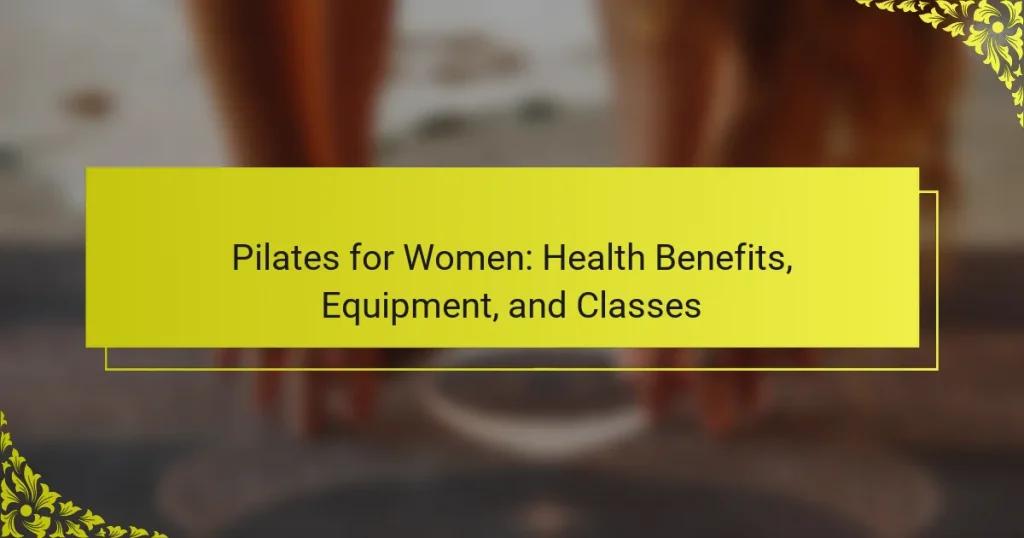Pilates offers significant health benefits for women, including improved flexibility, core strength, and posture. This low-impact exercise targets pelvic floor strength and promotes mental well-being. Common equipment like mats and reformers enhances workouts, making them suitable for various fitness levels. Finding the right class is essential for maximizing benefits and avoiding common mistakes.

What are the health benefits of Pilates for women?
Pilates offers numerous health benefits for women, including improved flexibility, core strength, and posture. It enhances muscle tone, promotes weight management, and reduces stress levels. Regular practice can lead to better balance and coordination, decreasing the risk of injury. Additionally, Pilates can alleviate back pain and improve overall body awareness.
How does Pilates improve core strength?
Pilates significantly enhances core strength by focusing on controlled movements and stability exercises. This method engages deep abdominal muscles, improving overall posture and balance. Research indicates that regular Pilates practice can lead to a 30% increase in core strength within a few weeks. Additionally, Pilates promotes better muscle coordination, which is essential for everyday activities.
Can Pilates aid in weight management?
Yes, Pilates can aid in weight management by enhancing muscle tone and increasing overall body awareness. This low-impact exercise improves core strength and can elevate metabolic rate. Regular practice may lead to better calorie burning, especially when combined with a healthy diet. Additionally, Pilates promotes mindfulness, which can help in making healthier lifestyle choices.
What role does Pilates play in injury prevention?
Pilates plays a significant role in injury prevention by enhancing core strength, flexibility, and body awareness. These attributes help stabilize muscles and joints, reducing the risk of injuries during physical activities. Research indicates that regular Pilates practice can improve muscle balance and coordination, essential for preventing overuse injuries. Additionally, Pilates emphasizes proper alignment and movement patterns, which can mitigate the risk of strain and injury.
How does Pilates enhance flexibility and posture?
Pilates significantly enhances flexibility and posture through targeted exercises that improve core strength and alignment. These movements stretch and strengthen muscles, promoting better posture by reinforcing the body’s natural alignment. Research indicates that consistent practice can lead to increased flexibility, with studies showing improvements in range of motion by up to 30% over several weeks. Additionally, Pilates focuses on controlled breathing and body awareness, which further supports postural improvements.

What equipment is commonly used in Pilates for women?
Common equipment used in Pilates for women includes mats, reformers, stability balls, resistance bands, and Pilates rings. These tools enhance workouts by providing support, resistance, and variety. Each piece of equipment addresses different aspects of strength, flexibility, and balance, making Pilates effective for various fitness levels.
What are the essential props for a Pilates workout?
Essential props for a Pilates workout include a mat, resistance bands, Pilates ring, stability ball, and reformer. These tools enhance flexibility, strength, and core stability. Each prop offers unique benefits that cater to different fitness levels and goals, making workouts more effective and engaging.
How do reformers differ from mat Pilates?
Reformers and mat Pilates differ primarily in their equipment and exercise approach. Reformers use a specialized machine that provides resistance, enhancing strength and flexibility. In contrast, mat Pilates relies solely on body weight and mats, focusing more on core stability and alignment. This equipment allows for a wider range of movements and modifications, making reformers suitable for various fitness levels. Additionally, reformers often facilitate deeper muscle engagement, which can lead to faster results in strength building compared to mat Pilates.
What are the benefits of using resistance bands in Pilates?
Using resistance bands in Pilates enhances strength, flexibility, and stability. They provide variable resistance, making exercises more effective. Resistance bands also improve muscle engagement, allowing for targeted workouts that can adapt to individual fitness levels. This equipment is portable and versatile, making it ideal for home or studio sessions.

What unique attributes does Pilates offer for women’s health?
Pilates offers unique attributes for women’s health, including improved core strength, enhanced flexibility, and better posture. It specifically targets pelvic floor strength, which is crucial for women’s health. Pilates also promotes mental well-being through mindfulness and stress reduction. Additionally, it provides low-impact exercise options suitable for various fitness levels.
How can Pilates support prenatal and postnatal health?
Pilates supports prenatal and postnatal health by enhancing strength, flexibility, and stability. It helps alleviate common discomforts during pregnancy and aids recovery postpartum. Key benefits include improved posture, reduced back pain, and increased core strength, which is essential for supporting the growing body. Additionally, Pilates promotes relaxation and mindfulness, contributing to overall well-being during this transformative period. Regular practice can enhance pelvic floor strength, vital for childbirth and recovery.
What specific modifications exist for women with injuries?
Pilates can be modified for women with injuries by adjusting exercises for safety and comfort. Common modifications include using props like resistance bands for support, reducing intensity, and focusing on alignment. This approach helps in rehabilitation while maintaining the benefits of Pilates, such as improved flexibility and core strength. Specific modifications may address unique attributes of injuries, ensuring a tailored experience for each participant.

What are the rare benefits of Pilates for women?
Pilates offers unique benefits for women, including enhanced pelvic floor strength, improved posture, and increased body awareness. These rare advantages contribute to overall well-being and can alleviate common issues like back pain and stress. Additionally, Pilates promotes a mind-body connection, fostering mental clarity and emotional balance.
Can Pilates improve mental health and well-being?
Yes, Pilates can significantly improve mental health and well-being. It promotes relaxation, reduces stress, and enhances mood through mindful movement and breathing techniques. Studies show that regular Pilates practice can lead to decreased anxiety and improved overall mental clarity. Additionally, the social aspect of group classes can foster a sense of community and support, further enhancing emotional well-being.
What unique Pilates classes focus on women’s specific needs?
Unique Pilates classes for women address specific needs such as prenatal support, pelvic floor strengthening, and post-menopausal health. These classes often utilize specialized equipment like the reformer and focus on alignment, flexibility, and core stability. For instance, prenatal Pilates emphasizes safe movements that accommodate a growing belly while enhancing strength and posture.

How can women find the right Pilates class for their needs?
Women can find the right Pilates class by assessing their fitness level, goals, and preferences. Consider classes that focus on specific needs, such as prenatal or postnatal Pilates, which cater to unique attributes of women’s health. Research local studios, read reviews, and inquire about class sizes and instructor qualifications. A trial class can help gauge compatibility with the instructor’s teaching style and the class atmosphere. Additionally, look for classes that utilize appropriate equipment, such as reformers or stability balls, to enhance the workout experience.
What should women look for in an instructor?
Women should look for instructors who prioritize safety, offer personalized guidance, and have relevant certifications. A qualified instructor enhances the Pilates experience, ensuring effective workouts tailored to individual needs. Look for those with experience in women’s health, as they understand unique physical requirements. Additionally, an instructor’s communication style and ability to motivate can significantly impact progress and enjoyment in classes.
How do online Pilates classes compare to in-person sessions?
Online Pilates classes offer flexibility and convenience, while in-person sessions provide direct instructor feedback and community interaction. Both formats support women’s health and fitness goals effectively. Online classes can be accessed anytime, accommodating various schedules, whereas in-person sessions foster a motivating environment through personal connections. Research indicates that both formats yield similar health benefits, such as improved flexibility and core strength, but the choice depends on personal preferences and lifestyle.
What are the best practices for starting Pilates as a beginner?
To start Pilates as a beginner, focus on proper form and gradual progression. Begin with foundational exercises to build strength and flexibility. Attend classes led by certified instructors for guidance. Invest in essential equipment like a mat and resistance bands. Consistency is key; aim for two to three sessions per week to see improvements.

What common mistakes should women avoid in Pilates?
Women should avoid common mistakes in Pilates to maximize benefits and prevent injury. Key mistakes include neglecting proper form, overtraining without adequate rest, skipping warm-ups, and not engaging the core effectively. Additionally, using unsuitable equipment or attempting advanced moves too soon can hinder progress. Focusing on these aspects ensures a safer and more effective Pilates practice.
How can improper technique affect results?
Improper technique in Pilates can lead to ineffective workouts and increased risk of injury. Incorrect form may prevent muscle engagement, reducing strength and flexibility gains. Additionally, poor alignment can strain joints and muscles, leading to discomfort. Consistent practice with proper guidance ensures optimal results and safety.
What misconceptions exist about Pilates for women?
Many misconceptions about Pilates for women suggest it is only for flexibility or is too easy. In reality, Pilates enhances strength, core stability, and overall fitness. It can be adapted for all fitness levels, providing challenging workouts. Some believe it is solely for women, but men also benefit significantly from Pilates practices.
How can women optimize their Pilates practice for better results?
Women can optimize their Pilates practice by focusing on proper technique, consistency, and tailored workouts. Prioritize engaging core muscles to enhance stability and strength. Incorporating various equipment, such as resistance bands and reformers, can increase workout intensity and effectiveness. Joining classes led by certified instructors ensures guidance and support, promoting safer, more effective practices. Regularly tracking progress helps in setting achievable goals, leading to better results over time.




